HOW CAN WE SEPARATE THE DEMOCRAT PARTY FROM THEIR PAYMASTERS IN RED CHINA???
THE OLD WHORE FEINSTEIN OF SAN FRANCISCO, EMPLOYED A CHINESE SPY FOR YEARS AS SHE CUT DEALS FOR RED CHINA IN THE U.S. SENATE THAT PAID HER PARASITE HUSBAND WADS OF MONEY!
When Biden took office, one of his first acts was the elimination of our border security. Like a power-hungry dictator, Biden simply decided to ignore our immigration laws. His catastrophic border policy resulted in untold millions of unidentified foreign citizens from around the world pouring into our country. Its impact is now being felt in cities across the country. The worst is yet to come. PETER LEMISKA
CUT AND PASTE YOUTUBE LINKS
JUST NOW: Biden is TOTALLY COMPROMISED by Communist China!
https://www.youtube.com/watch?v=caNTUxjth9Y
Biden’s America: Nearly 25,000 Chinese Nationals at U.S. Borders in 6 Months, 37,000% Increase in 3 Years

Under President Joe Biden, the number of Chinese nationals crossing the nation’s borders has increased by more than 37,000 percent in just three years, new Department of Homeland Security (DHS) data reveals.
In the last six months, which represents the first half of Fiscal Year 2024, nearly 25,000 Chinese nationals crossed United States borders and were encountered by Border Patrol agents.
During the same period in Fiscal Year 2021, just 65 Chinese nationals were encountered by Border Patrol while crossing U.S. borders. By the first half of Fiscal Year 2022, Chinese crossings had increased to 432 in the same period.
For the full 2023 fiscal year, Biden set a record where 24,125 had crossed U.S. borders and were encountered by Border Patrol.
In the first half of this fiscal year, though, Biden has already surpassed that record and could oversee nearly 50,000 Chinese nationals crossing the nation’s borders by September.
RELATED — John Rourke: I’ve Found Chinese, Russian IDs at Biden’s “Wide Open” Southern Border
Jack Knudsen / Breitbart NewsIn his opening statements during a budget hearing on Tuesday, House Homeland Security Committee Chairman Mark Green (R-TN) raised the issue of a record number of Chinese nationals crossing U.S. borders on DHS Secretary Alejandro Mayorkas’s watch.
“Beijing has shown that if we give an inch, they will take a mile, and Mr. Secretary, you have given them all 1,951 miles of our southwest border,” Green told Mayorkas.
John Binder is a reporter for Breitbart News. Email him at jbinder@breitbart.com. Follow him on Twitter here.
San Francisco's mayor, London Breed, comes calling on China
With bums going to the bathroom people's doorways, thieves smashing their car windows before robbing them, and retail establishments growing ever sparser owing to nobody prosecuting thieves, far-left San Francisco has done a bang-up job in chasing out businesses and taxpayers.
Which presents a crisis to them, as these falling sale-tax receipts and this retail vacancy picture have cut sharply into city revenue.
But rather than change their radical policies to make their city more liveable and bring in the taxpayer cash, as has been done in the past, San Francisco's mayor, London Breed, has found an easy way out: By selling out to China.
According to Breitbart News:
Much like when California’s far-left Gov. Gavin Newsom (D) made a politically useful visit to China in October, Chinese state media on Sunday fawned over visiting San Francisco Mayor London Breed (D).
“While Washington is taking a politically motivated hawkish stance on China to reiterate its global hegemony, Breed’s visit may set a good example of how sincere and pragmatic cooperation can take place in China-U.S. relations,” gushed China’s state-run Global Times.
Breed’s first stop was in Hong Kong, where China shocked the world by brutally suppressing the massive 2019 pro-democracy protests and imposing an authoritarian “national security law” that effectively criminalizes all dissent from the Communist Party.
Who needs to make a city liveable when you've got incoming Chinese cash to bail you out?
You can carry on the same old bad policies with the big moneybags with global ambitions from the next continent backfilling the deficit.
We have already seen at least some of this dynamic building, as when Breed ordered her city cleaned up, Potemkin Village-style, for the visit of China's leader, Xin Jinping, restoring it to its customary chaos after the man left. She took lots of flak for that, and rather then clean the city up 24/365 as seemed logical, she just ignored the criticism and went back to business as usual.
Why she isn't courting normal investors, foreign and domestic, but going for this guys, is kind of a red flag.
It's roughly the same dynamic seen in Venezuela when Hugo Chavez turned the country into a socialist hellhole. As locals sought to bail out, nobody was there to buy their properties because Chavez clearly didn't respect private property or rule of law. There was one exception, though -- FARC Marxist narcoterrorists from the Colombian side of the Venezuelan border. FARC'S terrorists wanted a good spot to launder their cash from the cocaine trade and a safe haven from Colombia's military. They didn't care if Venezuela had no rule of law, because they didn't need rule of law. What they had were guns and political muscle, which served as their working substitute for rule of law, ensuring that their property rights on the property they bought at firesale prices would never go disturbed. I observed this myself in Yaracuy state when I visited in 2005. People were desperate to get out. But the only eager buyers at the time were FARC, which put these people seeking to flee on the horns of a dilemma.
Which brings us back to San Francisco and its failure to restore rule of law there, in its abundant bum and criminal populations. Who do you sell to when you want to flee, but nobody wants to buy your property in a high-tax, high-crime, high-bum-exposure milieu?
The red Chinese of course, who would be delighted to set up a political power base in San Francisco through major property acquisitions, taking advantage of the progressive city's miserable real estate market and its leaders' refusal to improve the city's liveability. What do the Chinese need those things for when strategic advantage is the aim and they see even their own people as dispensible? Anything to have a political power base in a major American city, calling the shots there, and sending its people from its West Coast base into Washington.
Already they have a Chinese citizen on the board that counts San Francisco's election results, so the power base seems to primed to build. They have bought land and conducted questionable lab experiments in San Francisco's outskirts. The American public views them with a jaded eye as America's top adversary in recent polling.
Sound like the Chicoms are going to stop there? A power base, beginning on the socialism-weakened West Coast is the name of the game. The police stations, bought-off politicians, spy balloons, other spying, Fang-Fang honeytraps, legislative lobbying, propaganda education centers, state harassment of Chinese dissidents, the flow of fentanyl, and more, is bound to follow. So much for the sanctuary city thing for the actual dissidents.
And now in waltzes London Breed for her dog and pony show, courtesy of the ChiComs, just like the assorted third world dictators who sell their countries out to Chinese interests from the One Belt, One Road initiative. The Chinese have seen her kind before.
To the dictators' dismay, they often find that Chinese money comes with strings, something the gullible Breed is unlikely to notice, or care much about if she did.
It's always a good idea to follow the money in these junkets, particularly this one, since China is a major human rights violator, an oppressor of freedom-loving Hong Kong, an abuser of the peoples of Tibet and Xinjiang, a major fentanyl shipper, as well as a growing adversary to the U.S. in the Pacific.
In this case, the San Francisco Chronicle reports that the trip was financed by civic group called the San Francisco Special Events Committee, a private nonprofit run by a man named Tom Horn, focused on better-the-city civic projects. So far, so good. Horn began as the heir to an oil fortune, later became a supporter of gay-agenda causes, and then at the age of 40, added 'Francophile,' to his activities, and becoming well honored by the French government, and serving as honorary consul to Monaco. One of his fellow board members is wealthy socialite Charlotte Maillard Schultz, who is the widow of the late Secretary of State George Schultz from a late marriage, who is credited with swinging George rather leftward.
While they don't seem to have obvious interests in China, and I found no smoking guns on anything improper as I searched their history, it's interesting that they suddenly got interested in China for this trip. The group's Form 990 financial statement from 2021, the last year of availability, shows that their finances swing wildly from year to year, are 97% privately financed, yet they are not required to say who donated to them to send the mayor on her way. Could it be Chinese money they are fronting for as they arranged this trip? No one from the general public, at least, knows, and it would be good to know that pretty relevant fact as we watch this dog-and-pony show go on.
As for Breed, she's going the full junket on this trip, and there is little doubt she's traveling in style.
The San Francisco Chronicle reports:
Breed’s itinerary for her upcoming trip features meetings with Chinese-based businesses, including an electronics company, CVTE, and the air carriers Air China, Hainan Airlines and Shenzhen Airlines. Breed’s office framed those gatherings as a continuation of her administration’s endeavors to bring more international businesses and tourists to San Francisco as downtown grapples with a record-high office vacancy rate, an exodus of major retailers and sluggish foot traffic.
“The economic benefits of tourists that come here from China has been significant,” Breed said in an interview at her City Hall office Wednesday. “Tourists spend money. They shop downtown. They go to our neighborhoods. They eat in our restaurants. And we want to push for an economic boom.”Chinese tourism has recently shown signs of rebounding: China last year regained its pre-pandemic status as the leading country for visitor spending in San Francisco and San Mateo counties, according to SF Travel, the city’s tourism bureau.
Twenty years ago, this might have sounded good, but today it sounds just a little different, what with China's obvious bid to grab power all over the world and the feckless messes left in blue cities now there for the Chinese to scarf up.
It sounds like a way out for Breed, but it's more like a roach motel she's entering her city into, easy to get in and very difficult to get out of when the Chinese turn the screws.
As for the rest of us, all we can see is China getting an ever stronger and politically more powerful foothold into the U.S. from this, brought on by blue-city failure and mercenary greed. Other blue cities are likely to follow.
Advantage: China.
Image: Screen shot from NBC Bay Area News YouTube video
THE DEMOCRAT PARTY AND GEORGE SOROS' DESTRUCTION OF AMERICA
HOW THE RICH RULING CLASS HAVE FUKED OVER AMERICA COMING AND GOING!
"Final Warning: America's Last Chance Before Collapse" | Victor Davis Hanson
https://www.youtube.com/watch?v=5Aq2xd6ccgE
TikTok’s Campaign of Using Influencers to Target Lawmakers Could Backfire


WASHINGTON—Key congress members and their aides say they’ve been besieged by phone calls triggered by a campaign sent out by Chinese social media giant TikTok.
Some of their constituents were delivered full-screen notifications on TikTok.
“Tell your Senator how important TikTok is to you. Ask them to vote no on the TikTok ban,” the notification said.
“Now, if the Senate votes, the future of creativity and communities you love on TikTok could be shut down.”
The notification then urged users to enter their zip code to locate their senator’s phone number.
“Okay, listen, if you ban TikTok, I will find you and shoot you,“ one female caller says as others giggle in the background. ”That’s people’s job, and that’s my only entertainment. And people make money off there, too, you know. I’m trying to get rich like that. Anyways, I’ll shoot you and find you and cut you into pieces. Bye!”
The campaign began targeting members of the House ahead of a vote by the House Energy and Commerce Committee to move the bill to the House floor without giving the normally required week’s notice. After the legislation passed the House on March 13 in a 352–65 vote, senators began receiving the same calls.
It is too early to say whether TikTok’s mobilization campaign will bear fruit. It could just as easily scare lawmakers into action against the company rather than for it.
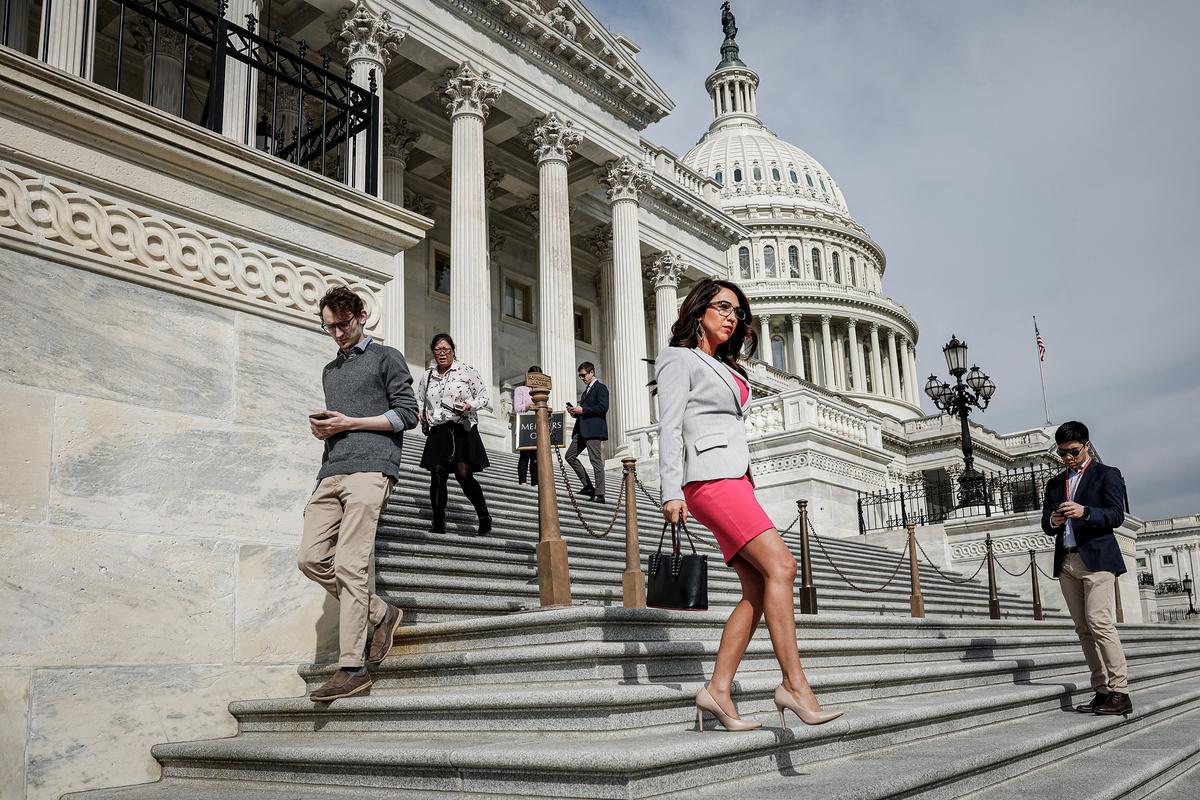
Sen. Marsha Blackburn (R-Tenn.) is one of many in the Senate who say that TikTok’s lobbying campaign is all the more reason to swiftly sever ties between the company and China.
TikTok’s parent company, ByteDance, is headquartered in Beijing, and both companies have a dubious history of suppressing content the Chinese Communist Party (CCP) finds displeasing.
“If TikTok wants to stay in the U.S. marketplace, they need to separate from the CCP’s control—plain and simple,” Ms. Blackburn told The Epoch Times.
“The Senate should take this issue up swiftly to protect our national security interests, and we should declassify the information given to Congress so that the American public can understand the exact threat we’re facing.”
TikTok is among the world’s most popular social media platforms, with more than 150 million users in the United States, many of whom get their news primarily from the platform.
That popularity, combined with the possibility that the platform could receive editorial direction from the CCP, creates an imminent threat, according to Ms. Blackburn and others in Congress.
It is unclear how much indirect control the CCP retains over ByteDance and TikTok. However, the regime purchased a “golden share” in ByteDance’s Chinese subsidiary in 2019, which could allow it to influence how the company’s board votes on key decisions. A golden share is usually a small amount of shares, but the stake gives the owner special voting powers, including veto power.
There are also growing indicators that some influencers on the platform are coordinating with the regime, according to Chihhao Yu, co-director of the Taiwan Information Environment Research Center.
Pro-CCP propaganda is now beginning to appear on TikTok in some instances before being published on Douyin, the version of the app available in China.
“Some of these TikTok videos are published before their Douyin counterparts by [Chinese] state media,” Mr. Yu said during an April 8 talk in Washington.
“So that’s an even stronger signal, indicating that these influencers on TikTok are having at least some kind of coordination with [Chinese] actors.”
Still, Mr. Yu said that the proliferation of misinformation and foreign influence operations online isn’t unique to TikTok. Instead, he said, it’s one problem among several.
“There are two more things: the top one is personal data security, and No. 2 is the addictiveness of the platform,” Mr. Yu said.
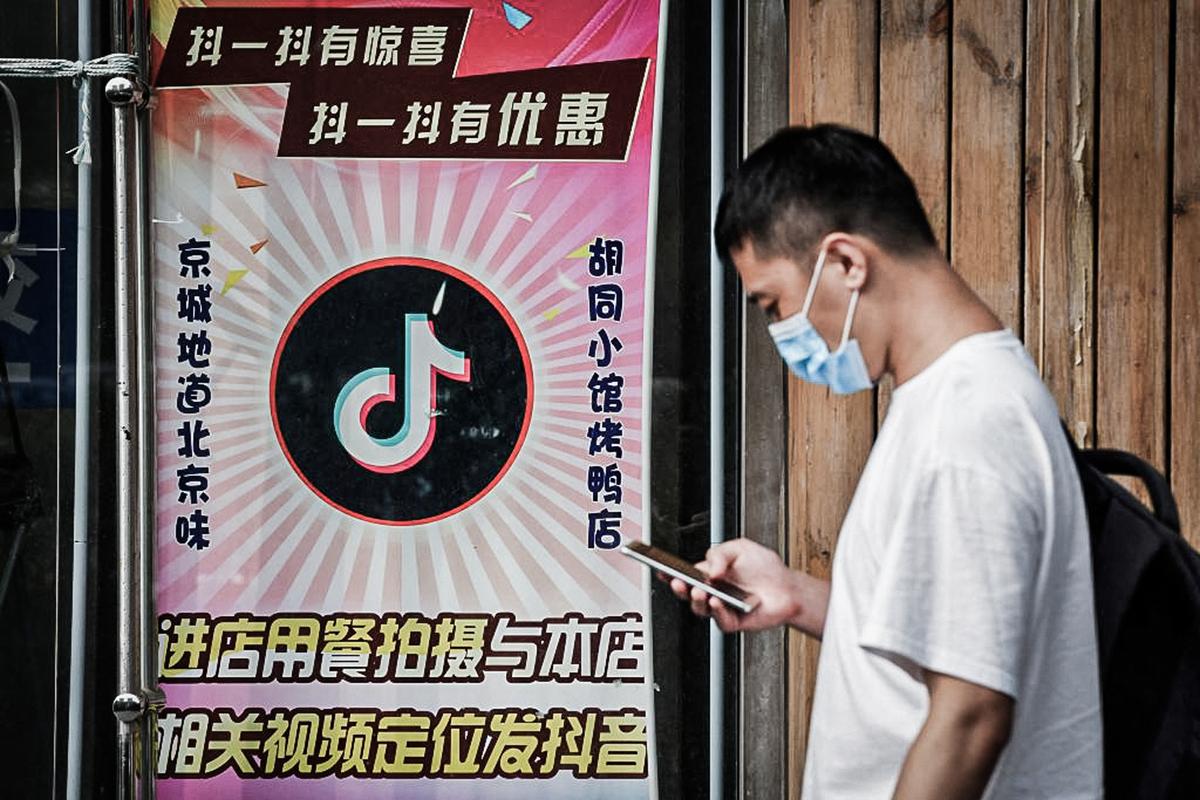
Data Security
Ms. Blackburn likewise believes that the foremost threat posed by TikTok is that ByteDance is required by law in China to provide any data it has to the CCP upon request, including whatever sensitive personal information it may have collected on Americans through TikTok.“TikTok’s parent company, ByteDance, is tied to the Chinese Communist Party by strict laws in Beijing that force companies to hand over users’ personal data,” Ms. Blackburn said.
Federal Communications Commission Commissioner Brendan Carr warned that TikTok is being used to collect troves of information on millions of American users, including “search and browsing history, keystroke patterns, biometrics, and location information.”
Indeed, the most recent version of the TikTok legislation was crafted in large part due to the threat posed by China’s security laws.
Rep. Mike Gallagher (R-Wis.), who chairs the influential House Select Committee on Strategic Competition with the CCP, said that’s why the bill includes language to force the divestiture of any social media company believed to be under the control of U.S. foes.
“This bill is squarely focused on preventing foreign adversaries—China, Russia, North Korea, and Iran—from controlling social media apps in the U.S.,” Mr. Gallagher told The Epoch Times.
“Under ByteDance’s ownership structure, the Chinese government not only has the ability to surveil Americans’ user data but also manipulate TikTok’s algorithm and conduct influence operations on Americans’ ‘For You’ pages,” he said.
“We simply cannot continue to allow an app controlled by our nation’s foremost adversary to take over the American media landscape.”
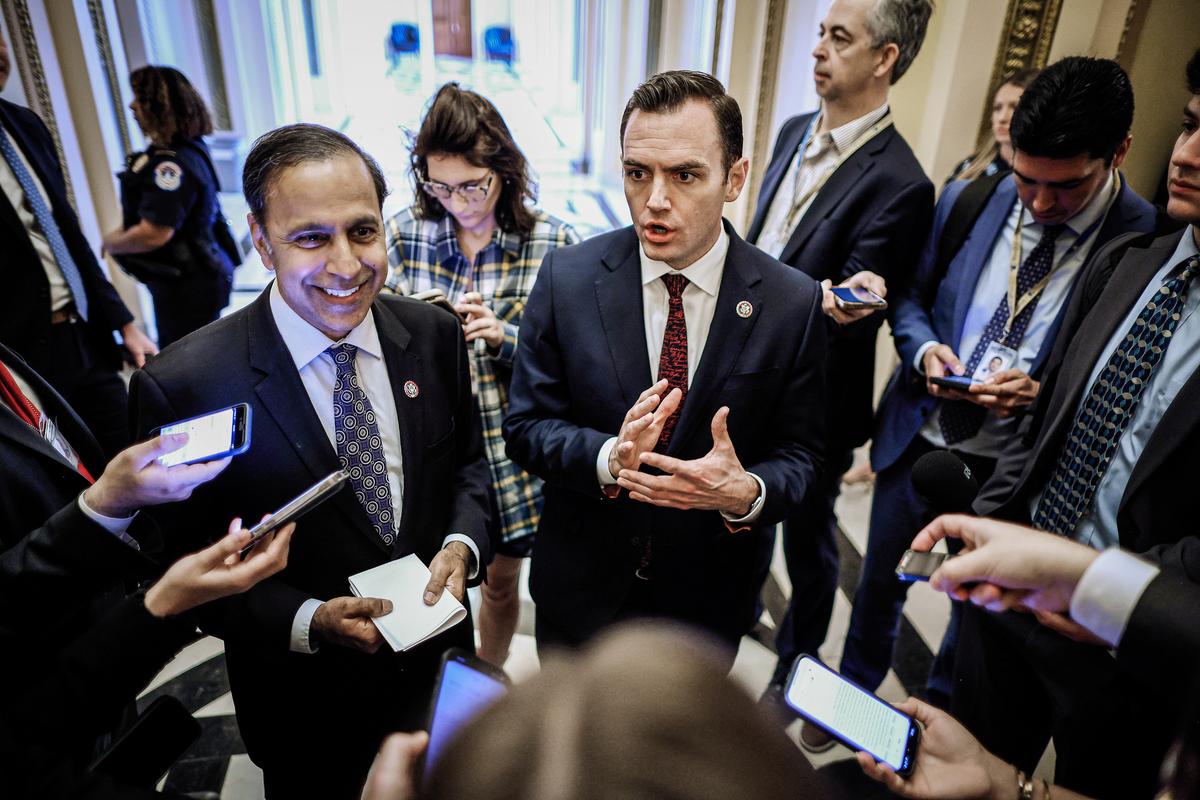
Opposition to TikTok Ban Grows
TikTok has painted the bill as a targeted ban on its operations and an assault on freedom of speech.“This bill is an outright ban of TikTok, no matter how much the authors try to disguise it,” a TikTok spokesperson told The Epoch Times in an email. “This legislation will trample the First Amendment rights of 170 million Americans and deprive 5 million small businesses of a platform they rely on to grow and create jobs.”
Opposition to the effort against TikTok is also growing in Congress, with a small but bipartisan minority in both chambers expressing numerous concerns about the legislation.
Speaking during the House vote on the legislation, Rep. Thomas Massie (R-Ky.) suggested that the bill could become a “Trojan horse” for perpetual overreach from the executive branch as it would empower the president to force the sale of social media companies deemed even indirectly influenced by foreign powers.
“I know the sponsors of this bill are sincere in their concerns and in their effort to protect Americans,” Mr. Massie said.
“[But] We don’t need to be protected by the government from information.”
There is also the question of whether the U.S. intelligence community has independently verified any of the claims that the CCP has directed the promotion or suppression of content on TikTok through ByteDance.
For this reason, Ms. Blackburn and many others in Congress have requested that their classified briefings on the subject be made public.
Some, however, have suggested that declassification wouldn’t unveil a unique threat.
Rep. Sara Jacobs (D-Calif.) said prior to the House vote that “not a single thing” Congress has heard in its classified security briefings is unique to TikTok, but pervades all social media.
Mr. Massie also highlighted numerous contentions about the bill’s premise and legality, including the fact that Bytedance is not actually owned by the CCP or even majority-owned by Chinese investors, that the bill has no sunset clause, and that the bill would require all appeals to be handled through the District of Columbia Court of Appeals rather than the states.
There is also the issue of whether the bill is lawful, given its reliance on presidential authority, an issue that several lawmakers, including Rep. Jim Himes (D-Conn.) and Sen. Rand Paul (R-Ky.), have spoken about.
That’s because the Cold War-era Berman Amendments revoked the Executive Office’s authority to ban or regulate the free flow of any “informational materials” to American citizens, including foreign propaganda.
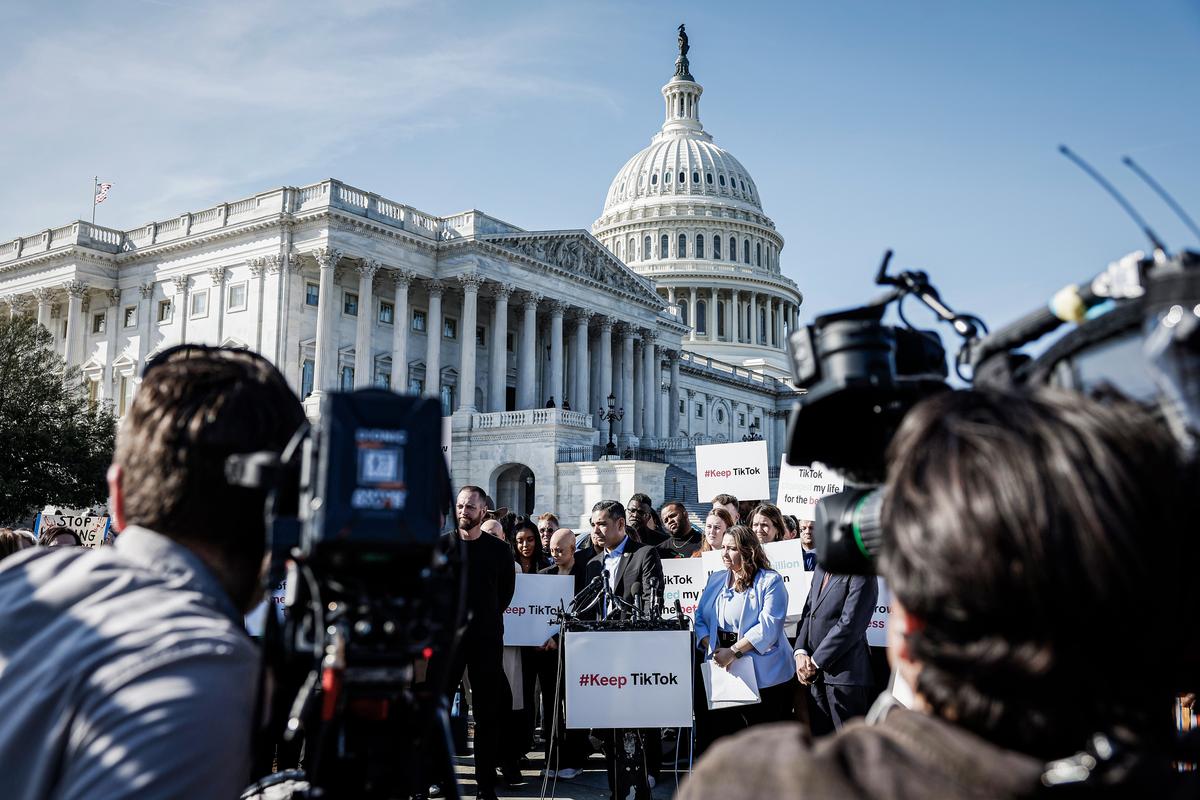
“One of the key differences between us and those adversaries is the fact that they shut down newspapers, broadcast stations, and social media platforms. We do not,” Mr. Himes said.
What’s Next?
For now, the bill’s future remains uncertain, though it’s clear it won’t sail through the Senate with the speed that it did the House.During his last days in office, Mr. Gallagher is playing the role of an unofficial whip, urging the Senate to take up the legislation as quickly as possible for fear that the CCP could use TikTok to promote propaganda ahead of the U.S. election cycle.
“This bill passed in overwhelming fashion with 352 votes in the House of Representatives, which I have not seen on something this important in my eight years in Congress,” Mr. Gallagher said.
“This level of support makes it impossible for the Senate to ignore. The White House has signaled that they will sign the bill if and when it passes the Senate, and I know Leader Schumer is very concerned about the threat posed by the Chinese Communist Party,” he said.
Reflecting on Taiwan’s recent experience with CCP election interference, Mr. Yu acknowledged the threat posed by the regime’s influence on social media.
Noting his three major concerns—CCP influence, data security, and addictiveness—he concluded that the freedom to speak and share ideas should not be curbed. Instead, he said, the problem of CCP misinformation would be solved by encouraging the exchange of debate and ideas rather than eliminating it.
“I think we need to address all [the] three big problems of TikTok and maybe, by extension, all social media platforms and what all these tech tools are doing to our democratic processes,” Mr. Yu said.
“Freedom of speech is why we do this—because we want a healthy democracy. It’s not because we want to get rid of something when we don’t want something in our country. We want a healthy functional debate of our country’s direction.”

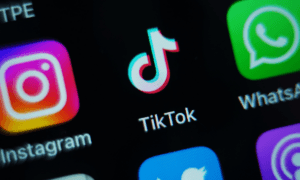

No comments:
Post a Comment